FW
"Industry, traders and farmers in India have appreciated the government's decision not to join RCEP deal. Union commerce and industry minister Piyush Goyal termed the deal against India's economic interests and national priorities. “We have consistently upholded our demands particularly over-controlling trade deficit, stronger protection against unfair imports and better market opportunities for Indian goods," he said."
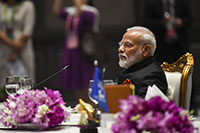 Prime Minister Narendra Modi announced India’s decision not to join the China-backed mega Regional Comprehensive Economic Partnership (RCEP) deal as negotiations between the nations failed to satisfy Indian government’s outstanding issues and concerns. The announcement was made during the Prime Minister’s speech at the RCEP Summit in Bangkok. He said, the present form of the Agreement does not fully reflect the basic spirit and the guiding principles of the RCEP. “India is looking at greater integration through this trade deal and had made efforts in those directions from the very beginning.”
Prime Minister Narendra Modi announced India’s decision not to join the China-backed mega Regional Comprehensive Economic Partnership (RCEP) deal as negotiations between the nations failed to satisfy Indian government’s outstanding issues and concerns. The announcement was made during the Prime Minister’s speech at the RCEP Summit in Bangkok. He said, the present form of the Agreement does not fully reflect the basic spirit and the guiding principles of the RCEP. “India is looking at greater integration through this trade deal and had made efforts in those directions from the very beginning.”
Industry hails decision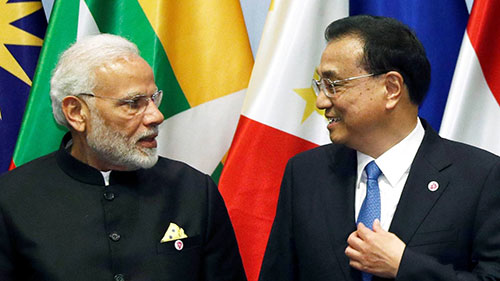
Industry, traders and farmers in India have appreciated the government's decision not to join RCEP deal. Union commerce and industry minister Piyush Goyal termed the deal against India's economic interests and national priorities. “We have consistently upholded our demands particularly over-controlling trade deficit, stronger protection against unfair imports and better market opportunities for Indian goods," he said. On similar lines, Union minister for Textiles and Women & Child Development Smriti Irani also hailed Modi's decision to put "nation first is reflected today in India's stand on RCEP." She said, Indian textile Industry is grateful for his intervention and support.
Relief to manufacturers and traders
The Clothing Manufacturers Association of India (CMAI) also welcomed the decision to not join RCEP. Rahul Mehta, President, CMAI called the RCEP “a double edged sword that would benefit only some Industries while others will suffer due to it.” This step by the Prime Minister will offer relief to thousands of small manufacturers and traders,” he said. However, Mehta advised the industry to stand on its own and face competition. “It is the responsibility of the government, industry associations, and industry itself, to create the right policy framework, the appropriate platform, and the will to evolve to reach that state,” he said.
Texcon-the annual textile conference organised by CII brings together leading players of the Indian textile industry, global buyers, and policymakers to deliberate on key areas of business, including regional as well as global issues concerning the sector. The conference also focused on emerging export opportunities and how Indian industries can leverage these for growth.
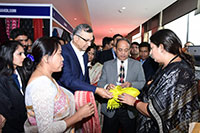 With 15 per cent share in the country’s export earnings and a 5 per cent share in its annual GDP, India’s textile and apparel industry holds a prominent position in the country’s economy. This has been achieved mainly due to easy access to raw materials that the country offers along with a pool of skilled manpower and its lucrative central and state policies. Also, the presence of complete value chain in textile and apparels benefits the sector.
With 15 per cent share in the country’s export earnings and a 5 per cent share in its annual GDP, India’s textile and apparel industry holds a prominent position in the country’s economy. This has been achieved mainly due to easy access to raw materials that the country offers along with a pool of skilled manpower and its lucrative central and state policies. Also, the presence of complete value chain in textile and apparels benefits the sector.
However, despite these inherent advantages, the Indian industry lags behind competing nations such as: Bangladesh, China, Vietnam etc, and as it is yet to realise its full potential as a supplier to the global markets.
Need to focus on exports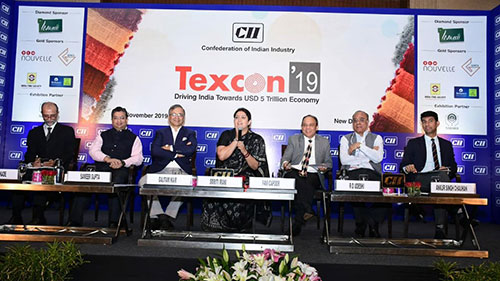
One of the key factors that differentiate India from all these nations is their focus on large, world class manufacturing set-ups across the value chain, crossborder innovations, research and prototype development, and sustainable fashion approach to withstand uncertain consumer demand. “If India aims to grow into a $5 trillion economy, it needs to rebrand itself as an export-driven economy,” said Ravi Kapoor, Textile Secretary at Texcon 2019 being held from November 4-5, 2019 in New Delhi. “However, it is not essential that a country makes everything under the sun. It needs to concentrate on four core areas: petroleum, gems and jewellery, engineering and textiles. These four constitute the chunk of India’s exports.”
Of these, India buys petroleum from outside, does a 6 to 7 per cent valuation on it and exports it to other countries. We also buy gems, stones and diamonds from outside, cut and polish them then add 5 to 7 per cent and valuation and export them. “It is only in the textile industry that we do the entire processing from fiber. This is the only sector that offers us maximum potential to explore. If we have to grow our textiles, we should concentrate on manmade fibers besides neutralising inverted duty structures,” Kapoor explained.
Texcon-the annual textile conference organised by CII brings together leading players of the Indian textile industry, global buyers, and policymakers to deliberate on key areas of business, including regional as well as global issues concerning the sector. The conference also focused on emerging export opportunities and how Indian industries can leverage these for growth.
Held on November 4 to 5, 2019 at the Lalit Hotel, New Delhi, Texcon 2019 conveys the importance of integrating, thinking and acting big in order to achieve global eminence. The theme of the conference this year is: ‘Rise of Indian Textile & Apparel Industry: What is the Need of the Hour’.
Japanese Premium stretch fiber Roica by Asahi Kasei and leading Italian company Sitip congratulate SCOTT Racing Team on this year's impressive achievements which include the victory at the Roc Laissagais, France, Uci Marathon series, and the Third prize at the Italian XCM 2019. The companies teamed together to create high performing and customized outfits for the athletes.
Rosti has exceptionally designed and produced this fully customized cycling suit, both graphically and technically. Everything has been entirely worked and finished by hand.
The exceptional talent of the athletes, Juri Ragnoli, Mattia Longa, Nicoletta Bresciani, Pietro Sarai, also enhanced by the technically advanced customized outfits, brought amazing results for the Season 2019.
The technical Thunderbike Power fabric by Sitip was selected for the shorts. Produced with the special ROICA Resistance, mixed with polyamide, the fabric is able to guarantee excellent bi-elasticity and an excellent elastic modulus over time as well as low deformability.
The high density of the threads enhances making it very compact and ensuring excellent fitting, high resistance to pilling, abrasion and maximum comfort. For the totally transfer printed T-shirts Sitip's Bicimania suggested this high breathable and quick-drying, ideal for the summer season, and extremely comfortable thanks to the ROICA premium stretch fiber.
"Founded by Dean Wegner, Founder and CEO, Authentically American gets its apparels manufactured by a whole list of US contract manufacturers. The company’s T-shirts are manufactured in Texas, while its hats are made in New Jersey, socks in North Carolina, and athletic jerseys in Georgia. Overall, the company has facilities in 12 states across the country."
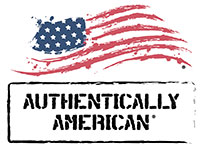 Authentically American-a Nashville-based apparel-making startup aims to revive the ‘Made in America’ label by reshoring a bulk of the production of custom branded garments. Currently, the company provides US-made custom branded apparels and merchandise to only corporate, educational, and nonprofit clients around the country. A $8 billion per year business, the company has posted growth rates of over 300 per cent each of the past couple years.
Authentically American-a Nashville-based apparel-making startup aims to revive the ‘Made in America’ label by reshoring a bulk of the production of custom branded garments. Currently, the company provides US-made custom branded apparels and merchandise to only corporate, educational, and nonprofit clients around the country. A $8 billion per year business, the company has posted growth rates of over 300 per cent each of the past couple years.
Founded by Dean Wegner, Founder and CEO, Authentically American gets its apparels manufactured by a whole list of US contract manufacturers. The company’s T-shirts are manufactured in Texas, while its hats are made in New Jersey, socks in North Carolina, and athletic jerseys in Georgia. Overall, the company has facilities in 12 states across the country.
The origin 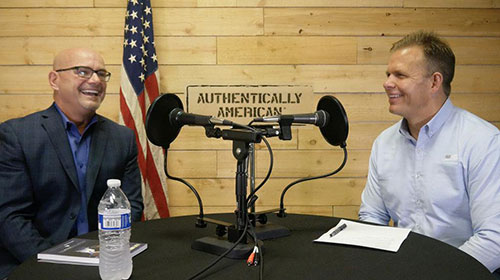
Authentically American was born out of Wegner’s curiosity over Procter & Gamble’s acquisitions of apparel brands across the country. His further digging into the issue led him to discover the huge potential that corporate and organisation-branded apparel business had in the US. He then decided to quit his sales job at P&G and move on to Mars Inc.
Another factor that drove him towards this business was his military career. In 2012 along with a partner he purchased an 18-year-old company called Omega Apparel. The company made uniforms including trousers, skirts, and slacks for the Army, Navy, Air Force, Marines, and Coast Guard. However, it didn’t satisfy his ultimate desire to launch an iconic brand and create jobs. Wegner sold his share of the company to his partner and launched Authentically American in July 2017.
Altruistic initiatives
The company progressed well in a short period. Besides its regular customers, the company also supplies apparels to universities like Belmont, Vanderbilt and Lipscomb, and a number of charities. They believe in giving back to the society whatever it receives from it.
In addition, Wegner is also committed to continuing to serve his brothers and sisters in arms. His company donates 10 per cent of proceeds to charities supporting U.S. military veterans, first responders, and their families. That combination garnered them some healthy publicity, including an appearance on Fox & Friends. While the company’s original business plan was to stick to the B2B side of things for a number of years, that publicity has prompted them to recently launch a consumer brand as well. According to Wegner, this will help the company accelerate its future growth.
Knitwear lifestyle brand, 22 Factor has launched a new 3D knitting service which allows designers to create their own garments. The Li & Fung-linked technology is described as a waste-minimising whole-garment production technology, as it allows designers to produce small volumes of stock in a short period of time.
The 3D knitting technology features an HD virtual sampling which allow designers to customise and visualise their designs without creating a physical sample in the traditional manual way. Using Shima Seiki’s wholegarment technology, the manufacturing process is shortened by 92 per cent while the quality of the garment remains.
The International Olympic Committee (IOC) has named Anta Sports Products as its official sportswear uniform supplier till the end of 2022. The agreement, which includes apparel, shoes and accessories, will see Anta supply IOC members and staff with sports apparel uniforms for the Winter Youth Olympic Games (YOG) Lausanne 2020, the Olympic Games Tokyo 2020, the Olympic Winter Games Beijing 2022 and the YOG Dakar 2022, as well as for the IOC administration's needs in Lausanne, according to a company press release.
Anta has been the official sports apparel partner of the Chinese Olympic Committee since 2009. The company was set up in 1991 as a comprehensive multi-brand sportswear company and first Chinese supplier of sportswear uniforms to IOC. The company also provided IOC uniforms for the Olympic Winter Games PyeongChang 2018 and the YOG Buenos Aires 201
Bangladesh is poised to become a hotspot for leather and leather goods much like the way it has been for apparels. Bangladesh produces nearly 400 million sq ft of rawhide, of which local leather and footwear companies consume 30 million sq ft. At present, there are some 180 registered leather goods exporters, up from less than 100 even a few years ago. Apart from registered members of the association, there are many micro and small investors who serve both domestic and international markets.
American brands have expressed interest in shifting to Bangladesh as their sourcing destination following the US-China tariff war. Foreign factories are also relocating to Bangladesh. For instance, Indian leather goods and shoe manufacturers have invested in Bangladesh.
Leather and leather goods exports are the second highest export earner for Bangladesh after garments. Now the country hopes for the Leather Working Group (LWG) certification. Getting the LWG certification means manufacturers comply with global compliance standards and that everything will be produced following international standards of compliance. In the absence of such certification, Bangladesh leather and leather good exporters are essentially shut out from upmarket destinations like the EU and the US and have to make do with sending their products to China, where prices are 40 per cent lower than elsewhere.
India Fashion Forum will be held in Bangalore on December 17 and 18, 2019. It will bring together fashion retailers from across the country to discuss current trends and innovation. Focus areas for the conclave include: how CEOs will have to adapt for the coming decade in retail, reimagining physical retail, and how the current year has been for India’s fashion consumers. The forum began hosting fashion summits in 2000 and aims at creating a platform for brands to launch new products and labels from as well as a place for businesses to join forces to forecast trends for the coming year.
IFF’s edition from March 27 to 28, 2019, saw participation from businesses including Fila, Raisin, Soch, Wondersoft, Sara, Tommy Hilfiger, Calvin Klein, Retale, Indi, Zarzoa, Woolmark and Pepe Jeans.
The fashion segment in India has grown in relevance over the years. India’s booming fashion and lifestyle market is drawing the attention of the world’s retailers and brands. The vastness of India’s fashion market, with the promise of growth at every price point, is the attraction. The laddering of going from tailor-made to ready-made and national branded to international brands and designer items is expected to increase the value of the market three or four times.
Bangladesh’s denim exports to the United States rose by 5.42 per cent in January to August, 2019.
In the same period, Vietnam’s denim exports to the US rose 34.43 per cent. Pakistan’s denim exports to the US rose 14.20 per cent. As the second-largest exporter of apparel goods, Bangladesh was supposed to gain from trade conflicts in capturing a bigger market share of denim products. However Bangladesh’s competitors, Vietnam and Pakistan, have gained a higher share. Most of China’s trade is shifting to Vietnam and Cambodia as US retailers and investors feel comfortable due to a shorter lead time and a better business environment. Vietnam has gained the most from the US-China trade conflict because of its readiness to welcome the redirected trade and it has a diversified product basket and received a large amount of FDI relocated from China. Buyers are not willing to come to Bangladesh as the ease of doing business is still lower compared to other competing countries. Vietnam and Pakistan have gained as they have devalued their currencies, while the appreciation of Bangladesh’s currency against the dollar is eating up Bangladesh’s competitiveness in global markets.
Bangladesh needs to offer better incentives such as quicker services by bringing in regulatory reforms to attract FDI and improving infrastructure to cut time in shipment.
The newly launched China Textile Association in Cambodia (CTAC) will encourage more Chinese investment into the garment industry in Cambodia and provide assistance to existing manufacturers.
CTAC is an association of Chinese textile enterprises, including garment manufacturers, as well as related suppliers such as accessories factories, trim suppliers and sub-contractors. It will provide legal advice to investors and those considering investing in Cambodia, as well as liaise with the government. Its services will particularly target Chinese investors.
Cambodia is the world’s eighth largest exporter of garments and footwear. Around half of these shipments go to the EU and a quarter goes to the US. The economy depends heavily on the garment industry, which accounts for more than 78 per cent of the country’s total merchandise exports and 20 per cent of its annual economic growth and is the main non-agrarian employer in the country with nearly 9,00,000 workers employed in over 1,000 factories. These factories are almost exclusively Chinese-owned, and China’s influence in Cambodia will continue to grow as it finances major infrastructure projects. However, risks in the financial sector persist, with particular exposure in the construction and real estate sectors. External risks include the potential withdrawal of the EU’s trade preferences for Cambodia.












